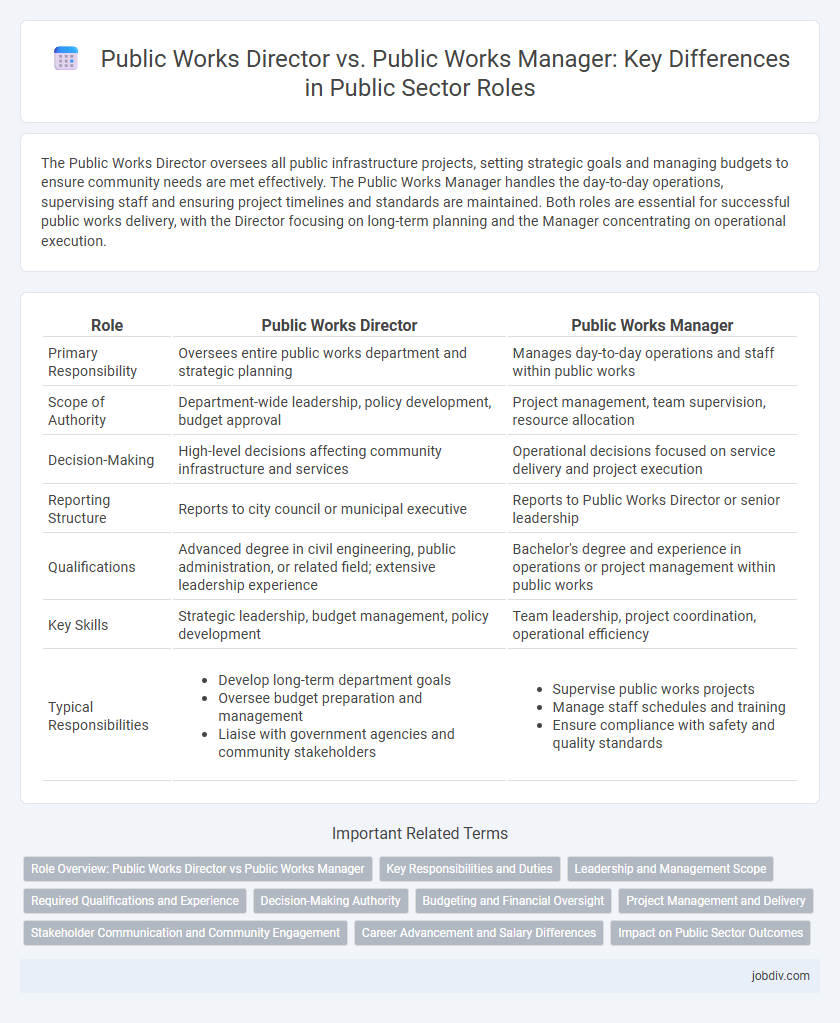The Public Works Director oversees all public infrastructure projects, setting strategic goals and managing budgets to ensure community needs are met effectively. The Public Works Manager handles the day-to-day operations, supervising staff and ensuring project timelines and standards are maintained. Both roles are essential for successful public works delivery, with the Director focusing on long-term planning and the Manager concentrating on operational execution.
Table of Comparison
| Role | Public Works Director | Public Works Manager |
|---|---|---|
| Primary Responsibility | Oversees entire public works department and strategic planning | Manages day-to-day operations and staff within public works |
| Scope of Authority | Department-wide leadership, policy development, budget approval | Project management, team supervision, resource allocation |
| Decision-Making | High-level decisions affecting community infrastructure and services | Operational decisions focused on service delivery and project execution |
| Reporting Structure | Reports to city council or municipal executive | Reports to Public Works Director or senior leadership |
| Qualifications | Advanced degree in civil engineering, public administration, or related field; extensive leadership experience | Bachelor's degree and experience in operations or project management within public works |
| Key Skills | Strategic leadership, budget management, policy development | Team leadership, project coordination, operational efficiency |
| Typical Responsibilities |
|
|
Role Overview: Public Works Director vs Public Works Manager
The Public Works Director oversees the strategic planning and overall management of public infrastructure projects, ensuring alignment with city policies and long-term goals. The Public Works Manager focuses on day-to-day operations, coordinating teams and managing project implementation to meet specific deadlines and regulatory requirements. Both roles are critical in maintaining public services, with the Director emphasizing leadership and policy direction, while the Manager prioritizes operational efficiency and staff supervision.
Key Responsibilities and Duties
Public Works Directors oversee strategic planning, budgeting, and policy development for infrastructure projects, ensuring compliance with regulations and long-term community development goals. Public Works Managers focus on daily operations, coordinating maintenance teams, managing resources, and executing projects according to established plans and timelines. Directors prioritize vision and stakeholder collaboration, while Managers emphasize operational efficiency and staff supervision within public works departments.
Leadership and Management Scope
The Public Works Director typically holds a higher leadership position with strategic oversight, responsible for setting long-term goals and policies for the entire department. In contrast, the Public Works Manager focuses on tactical management, overseeing daily operations and implementing the director's plans across specific divisions. Leadership scope for the director includes cross-departmental coordination and budget approval, while the manager's role centers on team supervision and project execution.
Required Qualifications and Experience
Public Works Directors typically require a bachelor's degree in civil engineering, public administration, or related fields, combined with 8-10 years of progressive experience in public works or infrastructure management. Public Works Managers generally need a bachelor's degree and 5-7 years of experience overseeing public works projects, with strong knowledge of budgeting, project management, and regulatory compliance. Leadership skills, technical expertise, and familiarity with municipal operations are essential qualifications for both roles, while Directors often require more strategic planning and policy development experience.
Decision-Making Authority
Public Works Directors hold higher decision-making authority, overseeing strategic planning, budget approval, and policy implementation for entire public works departments. Public Works Managers typically manage day-to-day operations, executing policies and supervising staff within specific projects or divisions. Directors set long-term goals and priorities, while managers focus on operational efficiency and problem-solving.
Budgeting and Financial Oversight
Public Works Directors hold primary responsibility for establishing and overseeing the entire departmental budget, ensuring alignment with governmental fiscal policies and strategic goals. Public Works Managers focus on managing budget execution, monitoring expenditures, and optimizing resource allocation within specific projects or divisions. Directors provide high-level financial oversight and approve major budget adjustments, while managers handle day-to-day financial tracking and reporting.
Project Management and Delivery
The Public Works Director oversees strategic project management and delivery, ensuring alignment with community goals, regulatory compliance, and budgetary constraints. The Public Works Manager focuses on the operational execution of projects, coordinating teams and resources to meet timelines and quality standards. Both roles require strong leadership, but the Director emphasizes high-level planning and stakeholder engagement, while the Manager prioritizes day-to-day project implementation.
Stakeholder Communication and Community Engagement
Public Works Directors oversee strategic stakeholder communication, ensuring alignment between municipal goals and community needs through high-level engagement and policy development. Public Works Managers focus on direct communication with community members and local stakeholders, facilitating day-to-day project updates and addressing immediate public concerns. Effective collaboration between both roles enhances transparency and fosters trust through consistent, targeted community outreach initiatives.
Career Advancement and Salary Differences
Public Works Directors typically oversee multiple departments and strategic planning, resulting in higher salary ranges often exceeding $100,000 annually, while Public Works Managers focus on operational management with salaries generally between $60,000 and $90,000. Career advancement from Manager to Director involves gaining expertise in budget management, policy development, and leadership skills crucial for overseeing large-scale projects and teams. Understanding these distinctions can guide professionals in the public works field aiming to escalate their career and maximize earning potential.
Impact on Public Sector Outcomes
The Public Works Director significantly influences public sector outcomes by setting strategic priorities, managing large-scale infrastructure projects, and ensuring compliance with regulatory standards, which drives long-term community development and resource allocation. In contrast, the Public Works Manager focuses on operational efficiency, supervising daily activities, and executing project plans to maintain public services and immediate infrastructure needs. Both roles are critical, but the Director's strategic oversight shapes broader policy impacts, while the Manager's operational management ensures the effectiveness of service delivery.
Public Works Director vs Public Works Manager Infographic

 jobdiv.com
jobdiv.com